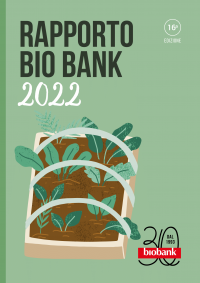
The new 'Bio Bank Report 2022' has been published and can be downloaded at this LINK .
In the face of ongoing climate change and its severe consequences, organic farming remains strategic for the ecological transition. As the new Bio Bank 2022 Report illustrates, the overall value of the Italian organic market has risen to 8.4 billion euros in 2022 (+12% over 2021, +134% in ten years), a very positive figure in these difficult times. But domestic consumption is marking time at EUR 3.9 billion, just 1.8% more than in 2021 (+95% on 2013), with inflation at 8.1%. On the other hand, consumption outside home is recovering sharply, amounting to 1.1 billion euros (+53% on 2021, +258% on 2013), and exports are growing steadily, reaching 3.4 billion euros (+16% on 2021, +168% on 2013), according to Nomisma data for Osservatorio Sana.
Italy: leader in organic exports
According to Fibl-Ifoam data, referring to 2020, the organic food market reached 121 billion euros globally (+13% on 2019, +151% in ten years) and 52 billion euros in Europe (+16 on 2019, +144% on 2011). Still double-digit increases over 2019, due to the pandemic that has driven up healthy consumption. But the pressure of the many consecutive and related crises in the following years is slowing down organic growth, so much so that Germany and France, which have always led the way in terms of domestic consumption, are having to deal with shrinking demand.
Italy's leading role is confirmed. Out of 48 European countries, Italy is in first place for exports and for the number of processing companies, more than 22 thousand out of more than 84 thousand, one in four. This is the driving force behind organic 'Made in Italy', which is so appreciated on foreign markets. It is again in first place for the number of agricultural producers, third for retail sales and agricultural areas, and fifth for the share of organic areas in the total UAA. This share was 16.6% in 2020, rising to 17.4% in 2021, against an EU average of 9.6%.
The trends of 3,600 organic activities
At the heart of the Bio Bank Report is data on more than 3,600 organic businesses surveyed in 2021, outlined through commentary, analysis and a rich set of information: Shops, Food E-commerce, Restaurants, Perfumeries, Cosmetics E-commerce. For the first time, the numbers of five out of six business types are slightly down on the previous year, with decreases of 3 to 6 per cent. The only exception is organic food e-commerce (+13%).
Over the last five years, however, double-digit growth is confirmed, with increases from 27% to 80% in the number of activities, except for two negative signs for shops (-14%) and restaurants (-9%). Lombardy, Emilia-Romagna and Veneto are confirmed as the leading regions in terms of the absolute number of organic activities, while Marche, Trentino-Alto Adige and Emilia-Romagna lead the way in terms of business density. Among the leading regions the key role of Emilia-Romagna stands out, the only one present in both rankings.
Not to be missed are the useful final pages with an up-to-date overview of the most authoritative sources of data on organic farming, along with stimulating contributions on the climate crisis and the limits of development, global risks and ecological transition.
Source: Bio Bank



